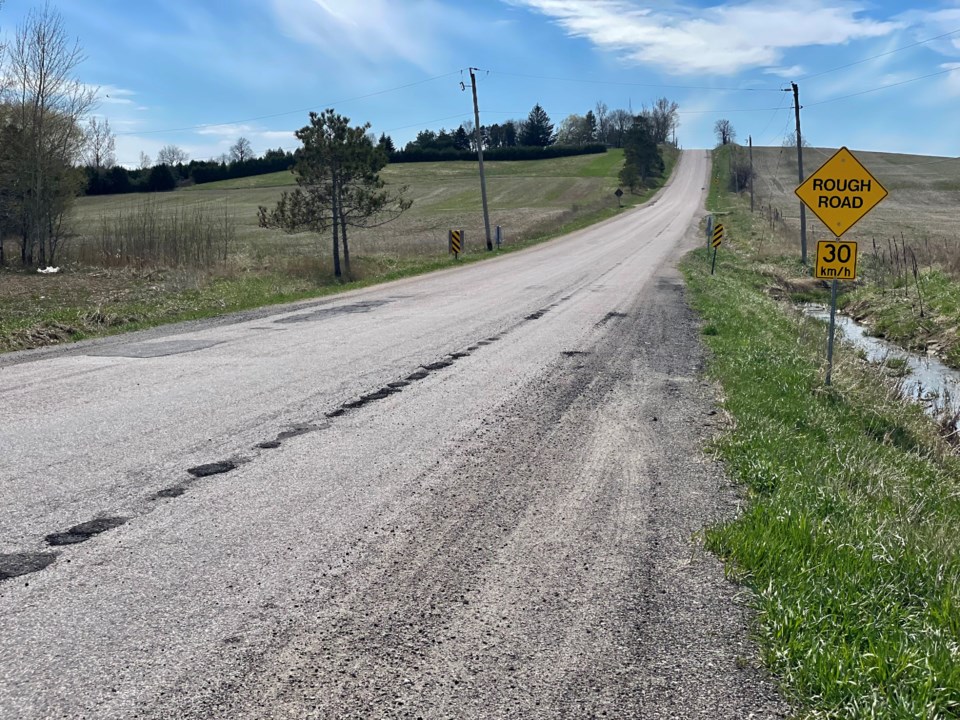The resurfacing of a portion of Line 8 near Bond Head was approved by Bradford West Gwillimbury council, but not without some controversy.
A 50mm hot-mix asphalt overlay will be used to repair the stretch of Line 8 between Sideroad 5 and County Road 27 by C. Valley Paving Ltd., who is the holder of the town’s road rehabilitation contract for 2021. Because it is merely being added to the existing contract, the $310,000 plus tax cost for the work didn’t go through a typical tender process.
This drew the ire of Lisbon Paving, a business located in the Artesian Industrial Park. They felt the process was unfair to a local business that could have done the job for less money.
Lisbon Paving’s Vice President Arlindo Araujo provided a written letter that Clerk Rebecca Murphy read on his behalf during the open forum portion of the May 3 council meeting.
“A BWG taxpayer, we want to ensure the taxpayers’ money is being spent efficiently while providing the greatest value for their tax dollars,” the letter read. “In order to maintain fairness and transparency, we submit that the Town of Bradford West Gwillimbury publicly tender the work to ensure the best value for taxpayers.”
Fewer than five years have passed since the last time construction was completed on the section of Line 8 in question. The 2018 resurfacing work has already failed, staff reported to committee-of-the-whole at the April 19 meeting, “due to a number of factors.”
The cost to complete the approximately three kilometre stretch of Line 8 with the 50 mm hot-mix overlay is almost double what a single surface treatment would cost, but the benefits are worth it, staff indicated, as it “would provide a more durable and longer-lasting repair.”
A similar treatment was used in 2020 on Canal Road, with no signs of any major surface defects or failures to date on the section between Wist Road and Day Street.
In the letter read at Open Forum, Lisbon provided an estimate of approximately $270,000 to complete the work, some $40,000 less than what town staff is currently budgeting. It stated that the costs outlined in the contract C. Valley won aren’t reflective of the work that will be done during the Line 8 resurfacing.
Thinking of taxpayer costs and supporting local business, Coun. Peter Dykie agreed with Lisbon’s request and wanted the project to go to tender.
“I see the spin-offs from Lisbon or any of these companies… gas, employment,” he said. “I think it should have been tendered for (8th) Line… I don’t believe it should have just been added on.”
However, the situation was a bit more complex than merely delaying the project and looking for a local, inexpensive bid. Chief among the roadblocks was the town’s own procurement policy, which follows international trade agreements that preclude preferential treatment to local vendors.
Several councillors were sympathetic to Lisbon’s concern but were content with the recommendation passed in committee during the previous meeting.
“Lisbon Paving is a wonderful company and has done great work for our town in the past and I’m sure they will in the future,” said Deputy Mayor James Leduc. “The April 19 committee-of-the-whole decision (is) consistent with how we’ve managed contracts in the past, including those with Lisbon. It was an appropriate business practice then, and is now, regardless of who the contractor is.”
Coun. Raj Sandhu agreed.
“It’s our current policy that we, as council, created,” Sandhu said. “Whether that policy is right for us, we can review it, see how it works, tweak it to make it better. But as far as just choosing the local company, our hands are tied.”
Sandhu also didn’t think it was appropriate for councillors to discuss tendering through emails and chats with businesses. Coun. Peter Ferragine pointed to staff as the ultimate experts in determining just how much money could or could not be saved if the project was to go to tender.
“We’re not procurement policy officers here,” he said. “(The numbers) look good based on the letter that Mr. Araujo wrote, that these are savings for the municipality, but I don’t know what that means: I don’t know if it’s the exact same job, I don’t know if it’s the exact same material. We’re not in that position.”
Dykie and Coun. Jonathan Scott – who unsuccessfully wished to have the motion separated, as all councillors agreed on the need to repair the road but not necessarily with the method of doing so – voted against the motion.
Later in the meeting, a staff report was requested looking at potential improvements to the town’s procurement policy, including a possible “Buy Canadian” proviso, refinement to the mid-season awarding procedure and climate change factors in successful tenders.



